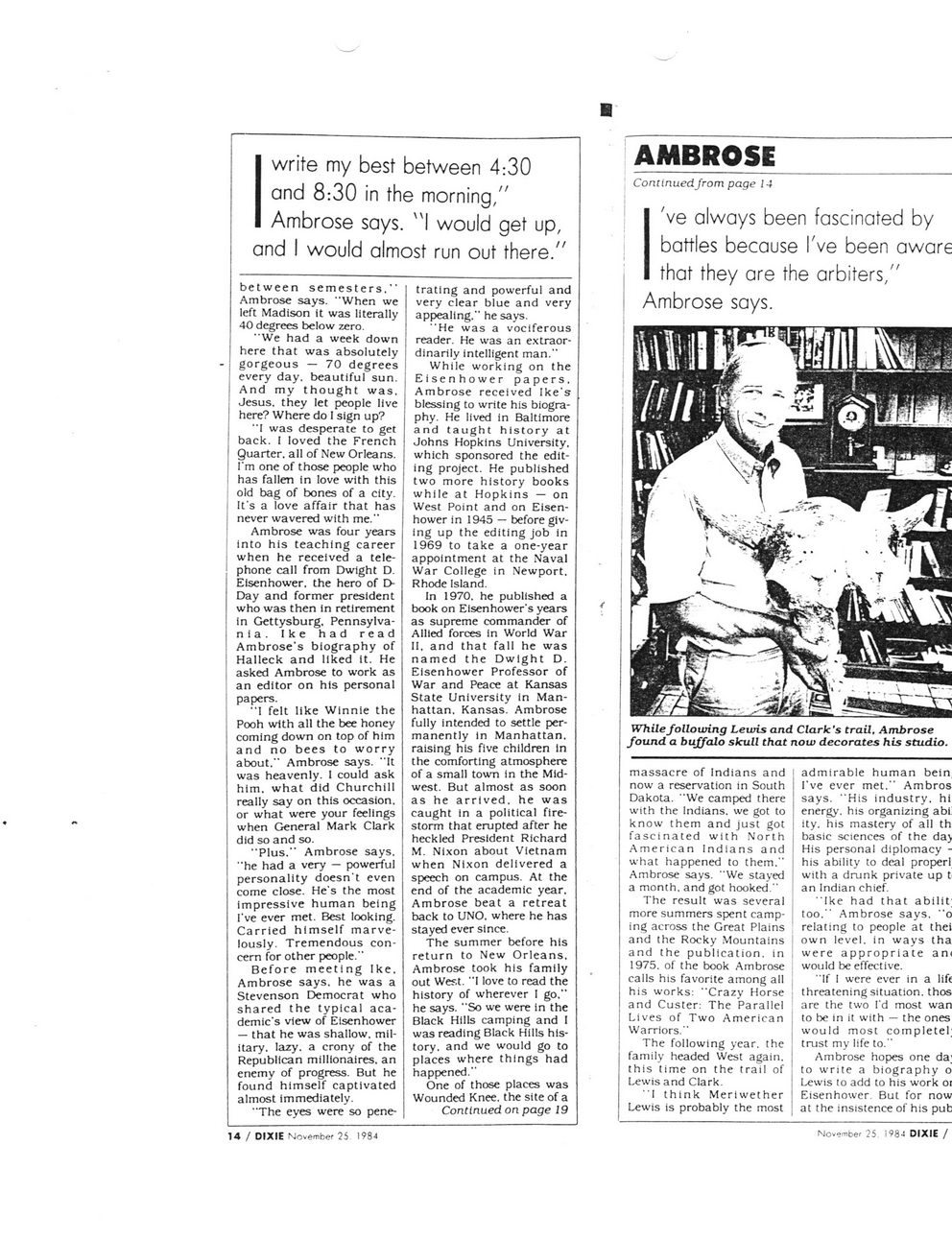This text was obtained via automated optical character recognition.
It has not been edited and may therefore contain several errors.
I write my best between 4:30 and 8:30 in the morning/' Ambrose says. "I would get up, and I would almost run out there/' between semesters," Ambrose says. "When we left Madison it was literally 40 degrees below zero. "We had a week down here that was absolutely gorgeous ? 70 degrees every day. beautiful sun. And my thought was. Jesus, they let people live here? Where do I sign up? "I was desperate to get back. I loved the French Quarter, all of New Orleans. I'm one of those people who has fallen in love with this old bag of bones of a city. It s a love affair that has never wavered with me." Ambrose was four years into his teaching career when he received a telephone call from Dwight D. Elsenhower, the hero of ? Day and former president who was then in retirement In Gettysburg. Pennsylva-nia. Ike had read Ambrose's biography of Halleck and liked it. He asked Ambrose to work as an editor on his personal papers. "I felt like Winnie the Pooh with all the bee honey coming down on top of him and no bees to worry about. " Ambrose says. "It was heavenly. I could ask him. what did Churchill really say on this occasion, or what were your feelings when General Mark Clark did so and so. "Plus.'' Ambrose says, "he had a very ? powerful personality doesn't even come close. He's the most impressive human being I've ever met. Best looking. Carried himself marvelously. Tremendous concern for other people." Before meeting Ike. Ambrose says, he was a Stevenson Democrat who shared the typical academic's view of Elsenhower ? that he was shallow, military. lazy, a crony of the Republican millionaires, an enemy of progress. But he found himself captivated almost immediately. "The eyes were so pene- trating and powerful and very clear blue and very appealing." he says. "He was a vociferous reader. He was an extraordinarily intelligent man." While working on the Eisenhower papers, Ambrose received Ike's blessing to write his biography. He lived in Baltimore and taught history at Johns Hopkins University, which sponsored the editing project. He published two more history books while at Hopkins ? on West Point and on Eisenhower in 1945 ? before giving up the editing job in 1969 to take a one-year appointment at the Naval War College in Newport. Rhode Island. In 1970. he published a book on Eisenhower's years as supreme commander of Allied forces In World War II, and that fall he was named the Dwight D. Elsenhower Professor of War and Peace at Kansas State University in Manhattan. Kansas. Ambrose fully intended to settle permanently In Manhattan, raising his five children in the comforting atmosphere of a small town in the Midwest. But almost as soon as he arrived, he was caught In a political firestorm that erupted after he heckled President Richard M. Nixon about Vietnam when Nixon delivered a speech on campus. At the end of the academic year. Ambrose beat a retreat back to UNO. where he has stayed ever since. The summer before his return to New Orleans, Ambrose took his family out West. "I love to read the history of wherever I go." he says. "So we were in the Black Hills camping and I was reading Black Hills history. and we would go to places where things had happened" One of those places was Wounded Knee, the site of a Continued on page 19 AMBROSE_________________________ Continued from page 14 've always been fascinated by battles because I've been aware that they are the arbiters," Ambrose says. While following Lewis and Clark's trail, Ambrose found a buffalo skull that now decorates his studio. massacre of Indians and now a reservation in South Dakota. "We camped there with the Indians, we got to know them and just got fascinated with North American Indians and what happened to them." Ambrose says. "We stayed a month, and got hooked " The result was several more summers spent camping across the Great Plains and the Rocky Mountains and the publication, in 1975. of the book Ambrose calls his favorite among all his works: "Crazy Horse and Custer: The Parallel Lives of Two American Warriors." The following year, the family headed West again, this time on the trail of Lewis and Clark. "I think Meriwether Lewis is probably the most admirable human bein I've ever met." Ambros says. "His industry, hi energy, his organizing abi! ity. his mastery of all th basic sciences of the da> His personal diplomacy -his ability to deal properl with a drunk private up t an Indian chief. "Ike had that abilit; too." Ambrose says, "o relating to people at thei own level, in ways tha were appropriate am would be effective. "If I were ever in a life threatening situation, thos are the two I'd most wan to be in it with ? the ones would most completel; trust my life to." Ambrose hopes one da; to write a biography o Lewis lo add to his work oi Eisenhower But for now at the insistence of his pub 14 / DIXIE November 25 1984 November 25. 1984 DIXIE /

Ambrose, Stephen Dixie-Magazine-Times-Picayune-11-25-84-005